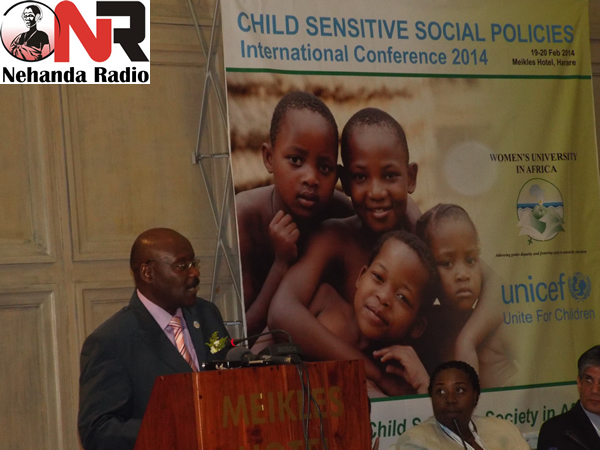By Byron Mutingwende
HARARE – Millions of children in Africa are orphaned and susceptible to multiple vulnerabilities, a situation that calls for a paradigm shift on child care initiatives, a Cabinet minister has said.

Speaking while officially opening the two-day International Child Sensitive Social Policies Conference organised by UNICEF and Women’s university in Africa held on Wednesday under the theme ‘Towards a Child Sensitive Society in Africa’, Health and Child Care minister David Parirenyatwa bemoaned the fact that policies by African governments fall short of meeting children’s needs.
“‘Towards a Child Sensitive Society in Africa’, the theme acknowledges that although efforts had been geared in that direction, our policies and programmes here in Africa, including our social budgeting processes, were not paying attention to the unique needs of children, and this has apparently resulted in gaps, leading to us not being able to achieve quality outcomes for our children. Thus the theme speaks volumes to us as leaders and child rights experts,” Parirenyatwa said.
Parirenyatwa said there was need for stakeholders’ combined efforts towards complying with the provisions set forth in such international child rights instruments like the United Nations Convention on the Rights of the Child and the African Charter on the Rights and Welfare of the child.
He said that Sub-Saharan Africa has the highest number of children orphaned by AIDS, as well as the highest incidence of child labour, child mortality and malnutrition among other such worst indicators in the world.
“Some may ask ‘according to whose standards?’. The task at hand therefore is to come up with solutions that best suit the unique situations of African children, at the same time upholding the fundamental children’s rights principles.”
Parirenyatwa hailed Zimbabwe for putting in place a new constitution which recognises the centrality of children in the country that also contains sections wholly devoted to the elaboration of children’s rights. He urged citizens to uphold the international instruments on children’s rights in order to help them realise their full potential.
Parirenyatwa urged Africans to desist from using a wholesale approach in the implementation of programmes and policies with regards to child care and protection. Instead, he said implementation should take into account the different cultural dynamics and contexts.
“The mammoth task ahead of you, therefore, is that of bringing harmony between these two conflicting points, working from your diverse backgrounds. It is my hope that as we come to the end of this conference, we should be able to come up with a strategy that strikes a balance between the universalist approaches and cultural relativist approaches, bearing in mind that the best interests of the child is paramount in all matters concerning children,” Parirenyatwa said.
Speaking on the same occasion, Dr Tendai Chakarisa, Programme Coordinator for the Child Sensitive Social Policies Programme at the Women’s University in Africa said it was sad to note that there was a widening gap between the quality of life and the development of Africa’s children and those of other continents.
“Yet …like all children elsewhere, African children have a right to protection, they have a right to survive, to be safe, to belong, to be heard and taken seriously, to access education and health care, receive adequate care and grow up in a protective environment. And there is no single effort more fundamental in saving this continent, than a transformation of the way we take care of our children,” Chikarisa said.
She said that the conference was about showcasing evidence based-research intended to improve the outcomes for African children. This would be done through identifying problems, needs, strengths and opportunities to drive change for children, she added.
“It is about the development of a collective vision and agenda across a range of stakeholders, determining shared goals and indicators, creating multi agency strategies, establishing ongoing learning and communication channels and taking steps towards a Child Sensitive Society in Africa.”
Top dignitaries at the conference included Vice Chancellor of the Women’s University – Professor Hope Cynthia Sadza, Country Representative of UNICEF Zimbabwe, Mr Reza Hossaini and Pro Vice Chancellor of the Women’s University in Africa, Professor Charles Muchemwa Nherera.






